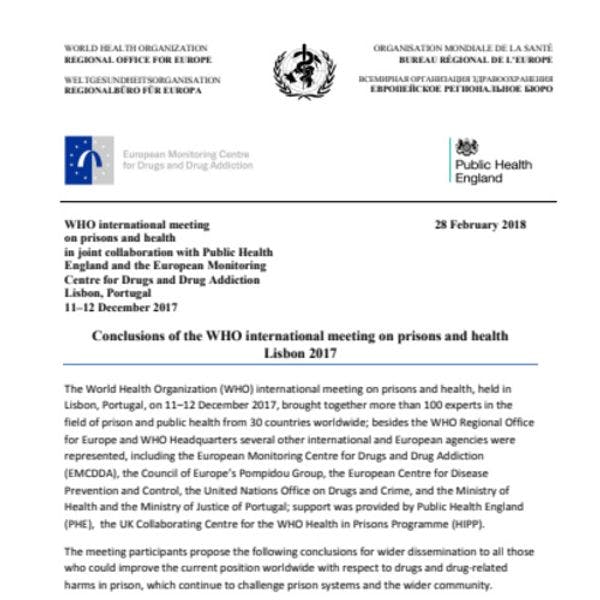Les conclusions de la réunion internationale de Lisbonne de l’OMS sur les prisons et la santé de 2017
Les conclusions approuvent les interventions de réduction des risques et exhortent les états membres à mener une réforme de la justice pénale qui comprenne des alternatives à l’emprisonnement/condamnation pour les infractions non violentes liées aux drogues. Pour en savoir plus, en Anglais, veuillez lire les informations ci-dessous.
The World Health Organization (WHO) international meeting on prisons and health, held in Lisbon, Portugal, on 11–12 December 2017, brought together more than 100 experts in the field of prison and public health from 30 countries worldwide; besides the WHO Regional Office for Europe and WHO Headquarters several other international and European agencies were represented, including the European Monitoring Centre for Drugs and Drug Addiction (EMCDDA), the Council of Europe’s Pompidou Group, the European Centre for Disease Prevention and Control, the United Nations Office on Drugs and Crime, and the Ministry of Health and the Ministry of Justice of Portugal; support was provided by Public Health England (PHE), the UK Collaborating Centre for the WHO Health in Prisons Programme (HIPP).
The meeting participants propose the following conclusions for wider dissemination to all those who could improve the current position worldwide with respect to drugs and drug-related harms in prison, which continue to challenge prison systems and the wider community.
The WHO international meeting on prisons and health contributes to sharing good practice internationally, maintaining and improving professional development and capacity in the prison health system; it also allows discussion of the challenges currently facing the prison setting with respect to public health and health service delivery and encourages debate on the scientific evidence that supports policy and intervention.
The meeting’s conclusions aim to fully acknowledge the role of prisons as important settings to address health inequalities and to recognize the status of people in prison as a disadvantaged group in terms of health and well-being. These conclusions direct the attention of policymakers, professionals and prison administrators to the necessity, in terms of both public health and social well-being, of enhancing knowledge and understanding of effective interventions on drugs and drug-related harms in prison (including tobacco- and alcohol-related health harms), and of ensuring that interventions to reduce drug use and drug-related health harms are evidence-based, particularly in a setting as sensitive as a prison, where people have been deprived of their liberty. Applicable also to people in youth detention settings, these conclusions recognize that – in order to achieve lasting improvements in the health of people who experience incarceration – treatment and prevention efforts in prison and youth detention settings must be sustained after these individuals return to the community.
